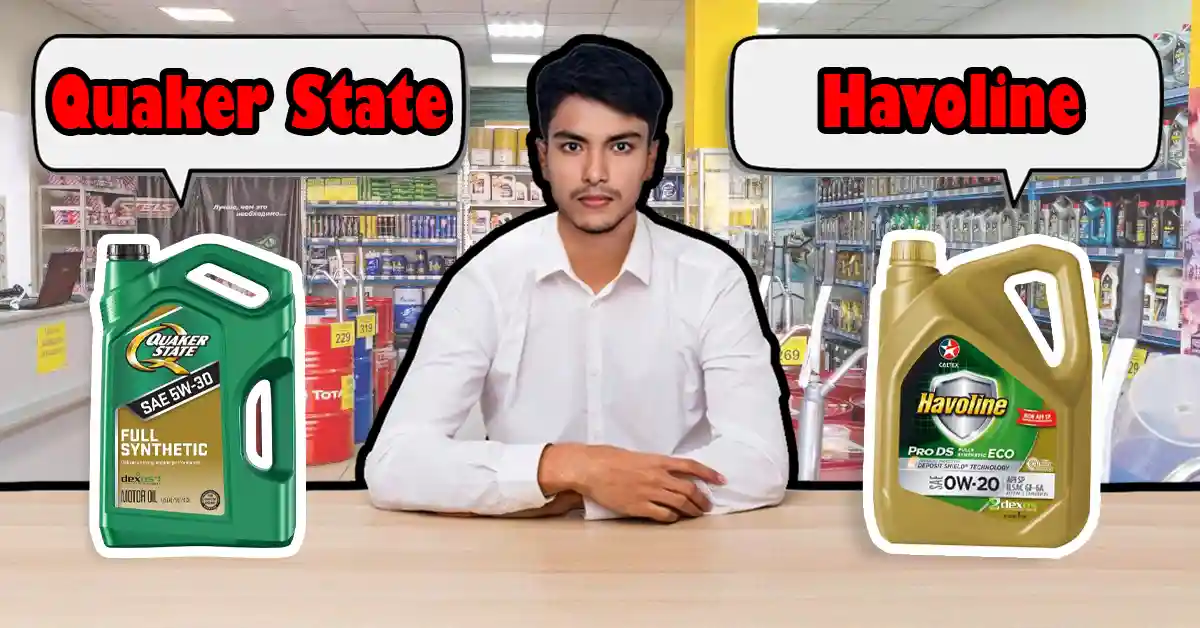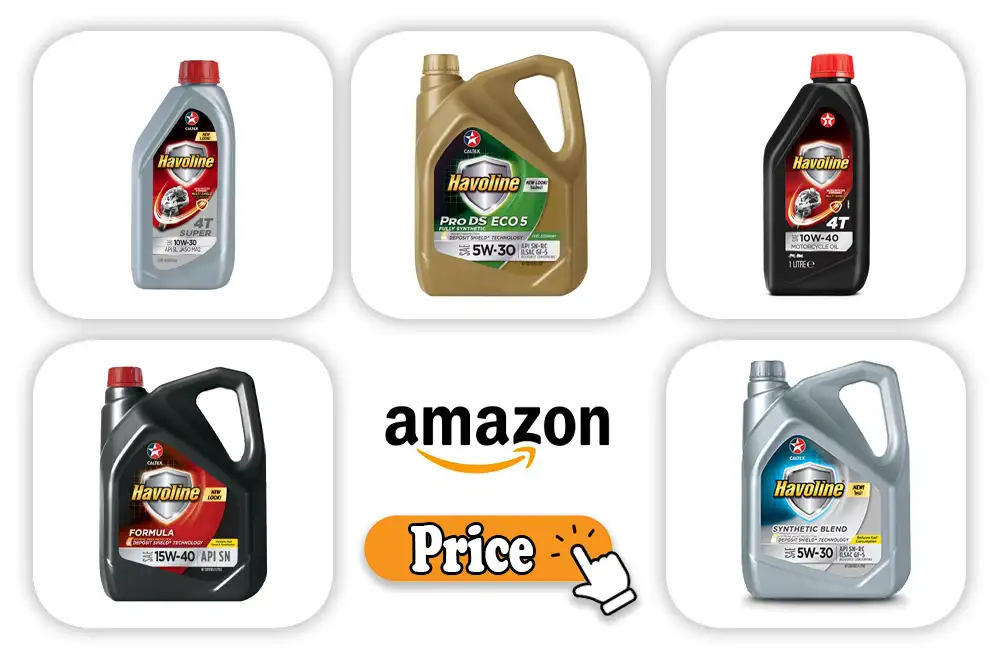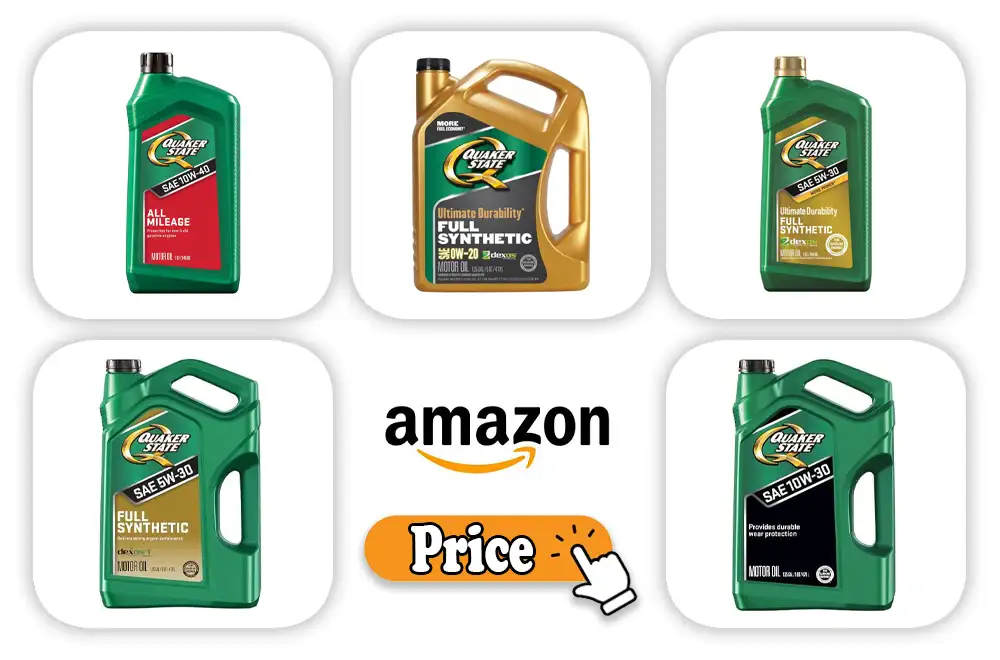Choosing the right motor oil matters, especially with tough U.S. driving conditions. Whether you’re driving in Florida’s heat or starting your truck in a New York winter, your engine needs strong protection. That’s why I tested Havoline vs Quaker State in real-world conditions.
In this review, I’ll share my experience to help you pick the best oil for a smoother, longer-lasting engine. Let’s dive in!
Table of Contents
Havoline Oil Review: A Reliable Choice for Engine Protection
Choosing the right engine oil can make a big difference in how your car runs. If you’re wondering whether Havoline motor oil is a good option, I’ve got you covered. I tested it in freezing mornings, long highway drives, and stop-and-go traffic. Here’s what I found.

My Real-World Experience with Havoline Oil
Cold Weather Start
Ever had trouble starting your car on a freezing morning? With Havoline 5W-30 full synthetic, my engine started smoothly. The oil flowed well, ensuring fast lubrication and less engine wear.
Long-Distance & Highway Driving
On road trips, my car ran quieter, and I saw a small boost in fuel efficiency. I got 1–2 extra MPG compared to conventional oil. That meant fewer stops for gas and a smoother ride.
Stop-and-Go Traffic
City driving is tough on engines. Heat builds up, and sludge can form. Havoline’s cleaning agents kept my engine cool and sludge-free. Even in summer, my engine stayed stable.
Key Features of Havoline Oil
- Viscosity Options: 0W-20, 5W-20, 5W-30, 10W-30, and high-mileage types.
- Oil Types: Full Synthetic, Synthetic Blend, and Conventional.
- Certifications: API SN Plus, ILSAC GF-6, and Dexos1 Gen 2.
- Additives & Benefits:
- Deposit Shield Technology – Prevents sludge buildup.
- Friction Modifiers – Improves fuel efficiency.
- Anti-Wear Agents – Reduces metal-on-metal contact.
- Deposit Shield Technology – Prevents sludge buildup.
- Oil Change Interval:
- Synthetic blends: Up to 7,500 miles.
- Full synthetic: 10,000+ miles (varies by driving conditions).
- Synthetic blends: Up to 7,500 miles.
What I Like
- Strong Engine Protection – Reduces wear and keeps parts clean.
- Smooth & Quiet Performance – Cuts down on engine noise.
- Great in Hot & Cold Weather – Works well year-round.
- Longer Oil Change Intervals – Saves time and money.
- Better Fuel Efficiency – Helps lower gas costs.
What Could Be Better
- Higher Cost – More expensive than regular oil.
- Not Ideal for Older Engines – Some high-mileage cars may need thicker oil.
- Limited Availability – Some viscosity grades can be hard to find.
- Needs a Good Oil Filter – Works best with high-quality filters.
Who Should Buy Havoline Oil?
- If you drive long distances or take frequent highway trips.
- If you live in extreme cold or hot weather.
- If you own a modern, turbocharged, or hybrid vehicle.
- If you want longer oil change intervals.
Who Should Look Elsewhere?
- If you’re on a tight budget and need a cheaper oil.
- If you drive an older, high-mileage vehicle that needs thicker oil.
- If you need racing or high-performance oil.
Final Verdict: Is Havoline Worth It?
After thousands of miles, I can say Havoline is a great choice. It protects the engine, boosts fuel efficiency, and lasts long.
Compared to Mobil 1, Pennzoil, and Castrol, Havoline stands out with its Deposit Shield Technology. While it costs more than regular oil, the longer oil change intervals and fuel savings make it worth it.
If you want a high-quality oil that keeps your engine in top shape, Havoline is an excellent choice.
👉🏿👉🏻 Check Latest Price and Offer at Amazon 👈🏻👈🏿
Quaker State Review: Is This the Right Motor Oil for Your Car?
Choosing the right motor oil matters. It affects how your car runs, how long it lasts, and even fuel economy. If you’re thinking about Quaker State, I tested it for you! I used Quaker State Full Synthetic 5W-30 in different driving conditions. Here’s what I found.

My Real-World Experience with Quaker State Oil
Cold Weather Start: Smooth Even in Freezing Temps
Cold mornings can make starting your car hard. In 15°F weather, my engine started right away. The oil flowed fast, reducing wear. No rough starts or extra noise—just smooth ignition.
Long Highway Drives: Quieter Ride & Better MPG
On a 1,000-mile trip, my car ran quieter. I also got about 2-3% better fuel economy. The friction-reducing additives helped minimize engine strain.
City Driving: Handles Stop-and-Go Well
Heavy traffic in 90°F heat can be tough on oil. After weeks of testing, my engine stayed cool and smooth. Even with frequent stops, there was no performance drop.
Before vs. After Switching
I used a synthetic blend before. My car felt sluggish over time. After switching to Quaker State Full Synthetic, acceleration felt better. Plus, oil changes lasted up to 10,000 miles.
Key Features of Quaker State Oil
Viscosity Options:
- 5W-30 (Great for all seasons)
- Other options: 0W-20, 10W-30
Oil Type:
- Full Synthetic (Better protection than conventional oil)
Certifications & Approvals:
- API SP & ILSAC GF-6A certified (Meets industry standards)
- GM 6094M, Chrysler MS-6395 approved
Key Benefits:
- Anti-Wear Protection – Reduces friction and engine wear
- Friction Modifiers – Improves fuel economy
- Detergents – Keeps the engine clean
- Oxidation Resistance – Extends oil life
Oil Change Interval:
- Lasts up to 10,000 miles (Depends on driving conditions)
- Backed by a 10-year / 300,000-mile warranty (If used regularly)
What I Like About Quaker State Oil
- Strong Engine Protection – Keeps engine parts clean and reduces wear.
- Smooth & Quiet Performance – Lowers engine noise.
- Works in All Weather – Handles both cold and hot conditions.
- Long Oil Change Intervals – Saves time and money.
- Better Fuel Efficiency – Improves MPG.
What Could Be Better
- Higher Price Than Conventional Oils – But offers better protection.
- Not Ideal for Older Engines – High-mileage cars may need a different formula.
- Limited Availability – Some viscosity grades are harder to find.
- Works Best with a Premium Oil Filter – Use a high-quality filter for top performance.
Who Should Buy Quaker State Oil?
- Drivers Who Want Long-Lasting Protection – Fewer oil changes, extended engine life.
- People in Extreme Climates – Works well in both heat and cold.
- Highway & Long-Distance Drivers – Improves fuel economy and performance.
- Owners of Modern Vehicles – Great for turbocharged and hybrid engines.
Who Should Consider Other Options?
- Budget-Conscious Drivers – Conventional oil is cheaper.
- Owners of High-Mileage Cars – Older engines may need a different oil.
- Performance Enthusiasts – If you race, you might need a high-performance oil.
Final Verdict
After testing Quaker State Full Synthetic 5W-30, I highly recommend it. It offers strong engine protection, better fuel economy, and long-lasting performance.
It competes well with Mobil 1, Pennzoil, and Castrol but often costs less.
Should you switch? If you use a synthetic blend or conventional oil, upgrading to Quaker State Full Synthetic can improve your engine’s lifespan. It’s a smart investment for any driver.
👉🏿👉🏻 Check Latest Price and Offer at Amazon 👈🏻👈🏿
Havoline vs Quaker State: A Detailed Comparison
Choosing the right motor oil matters. Havoline vs Quaker State is a common debate among drivers. I’ve used both brands in extreme cold, hot summers, and long road trips. Here’s what I found.
Viscosity: Havoline vs Quaker State
Oil viscosity affects flow in different temperatures. A good oil should stay smooth in the cold and stable in the heat.
| Aspect | Havoline | Quaker State |
| Cold Start Flow | Smooth start | Thicker flow |
| High-Temp Stability | Stays stable | Good stability |
| Viscosity Options | Wide range | Fewer choices |
Rating: Havoline: 9/10 | Quaker State: 8/10
Oil Type: Havoline vs Quaker State
Both brands offer synthetic, semi-synthetic, and conventional oils.
| Oil Type | Havoline | Quaker State |
| Synthetic | Available | Available |
| Semi-Synthetic | Available | Available |
| Conventional | Yes | Yes |
Rating: Havoline: 9/10 | Quaker State: 9/10
Additive Quality: Havoline vs Quaker State
Additives help prevent sludge, reduce wear, and keep engines clean.
| Additive | Havoline | Quaker State |
| Detergents | Strong | Moderate |
| Anti-Wear Agents | High-quality | Standard |
| Friction Modifiers | Advanced | Moderate |
Rating: Havoline: 9/10 | Quaker State: 7.5/10
👉🏿👉🏻 Check Latest Price and Offer at Amazon 👈🏻👈🏿
Engine Protection: Havoline vs Quaker State
Good motor oil prevents wear, stops sludge, and helps engines last longer.
| Protection Area | Havoline | Quaker State |
| Wear Prevention | Excellent | Very good |
| Sludge Control | Superior | Good |
| Longevity | Long-lasting | Decent |
Rating: Havoline: 9.5/10 | Quaker State: 8/10
Fuel Efficiency Impact: Havoline vs Quaker State
Oil can improve fuel economy by reducing engine friction.
| Factor | Havoline | Quaker State |
| MPG Improvement | Noticeable | Slight |
| Engine Smoothness | Excellent | Good |
| High-Mileage Benefits | Strong | Moderate |
Rating: Havoline: 9/10 | Quaker State: 7.5/10
Temperature Performance: Havoline vs Quaker State
For extreme weather, oil must work in both hot and cold conditions.
| Temperature Condition | Havoline | Quaker State |
| Cold Start | Very smooth | Decent |
| High Heat | Stays stable | Works well |
| Extreme Conditions | Great performance | Moderate |
Rating: Havoline: 9/10 | Quaker State: 7.5/10
Longevity: Havoline vs Quaker State
How long does each oil last before needing a change?
| Longevity Factor | Havoline | Quaker State |
| Change Interval | 7,500-10,000 miles | 5,000-7,500 miles |
| High-Mileage Use | Strong | Moderate |
| Extended Drain Options | Yes | No |
Rating: Havoline: 9/10 | Quaker State: 7/10
👉🏿👉🏻 Check Latest Price and Offer at Amazon 👈🏻👈🏿
Final Recommendation: Havoline vs Quaker State
Both oils work well, but they fit different needs:
- Choose Havoline if you drive in extreme temperatures, want a cleaner engine, and prefer longer oil change intervals.
- Choose Quaker State if you want a budget-friendly option for daily driving.
FAQs: Havoline vs Quaker State
Which is better, Havoline or Quaker State?
Havoline lasts longer and protects high-mileage engines better. Quaker State is a solid, budget-friendly pick for daily driving. The best choice depends on your needs.
Does Havoline or Quaker State improve fuel efficiency more?
Havoline’s additives reduce friction, slightly boosting fuel efficiency. But results depend on your engine and driving habits.
Which oil works better in extreme weather?
Havoline handles heat and cold better, making cold starts smoother and preventing thickening in freezing weather. Quaker State works well but may thicken more in the cold.
How often should I change my oil?
Havoline lasts up to 10,000 miles. Quaker State needs changing every 5,000–7,500 miles. Follow your car’s manual for the best schedule.
Is Quaker State good for high-mileage cars?
Yes, but its high-mileage formula may not last as long as Havoline’s. For cars over 75,000 miles, Havoline might be the better pick.




